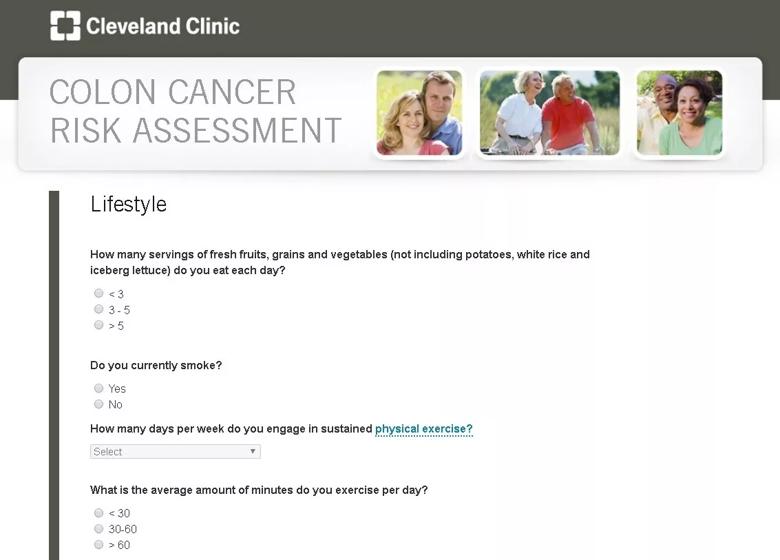Cleveland Clinic Research Presented at Digestive Disease Week 2017
Cleveland Clinic News Service | 216.444.0141
We’re available to shoot custom interviews & b-roll for media outlets upon request.
CCNS health and medical content is consumer-friendly, professional broadcast quality (available in HD), and available to media outlets each day.

A Cleveland Clinic colon cancer risk assessment survey found that respondents who exercised more, followed a healthy diet and did not smoke were less likely to have a personal history of colorectal cancer or colon polyps. The online risk analysis, which has had more than 27,000 responses from around the world, highlights the modifiable risk factors, such as diet and lifestyle behaviors, reported by patients without a personal history of colorectal cancer and polyps.
The research team also found that less than 10 percent of all respondents stated they ate five or more servings of fruit, vegetables and grains per day and only about 25 percent undertook at least 30 minutes of exercise four times per week. They additionally found that only 36 percent of respondents were up to date with current colorectal screening, according the to the U.S. Preventive Services Task Force guidelines.
“Colon cancer is a preventable disease. These results emphasize the known modifiable factors that can alter the risk,” says Carol A. Burke, MD, a Cleveland Clinic gastroenterologist and the current president of the American College of Gastroenterology. “Colon cancer has had significant decline in the U.S. since 1980 when colorectal cancer screening was first introduced, but these results show screening for the disease – and adherence to a healthy lifestyle – appear woefully underutilized.”
Dr. Burke and colleagues developed the online survey to provide respondents information about their colorectal cancer risk based upon self-reported personal and family history of colorectal cancer and polyps. The survey generates suggestions for each participant to modify risk factors through screening as well as lifestyle and dietary changes. Dr. Burke and co-investigator David Dornblaser, MS, presented their findings in two separate analyses on Sunday, May 7, at Digestive Disease Week 2017.

Image content: This image is available to view online.
View image online (https://assets.clevelandclinic.org/transform/bf9fc7ad-f22b-43b8-9cae-648f1c839ced/colon2_jpg)
Cleveland Clinic colon cancer risk assessment
The five-minute web-based questionnaire, which can be found at clevelandclinic.org/preventcoloncancer, asks respondents about age, gender, ethnicity, height, weight, dietary factors, smoking history, physical activity, personal and family history of colorectal cancer or polyps, and adherence to screening.
The results showed that the respondents more likely to be adherent to colorectal cancer screening were white and female. They also had less exposure to cigarettes, ate more daily servings of a plant-based diet and exercised more than those who were not up to date with screening. The data also indicated that respondents with a first-degree relative with colorectal cancer and polyps were significantly more likely to adhere to screening: 35.7 percent were adherent compared with 19.4 percent of participants without an affected first-degree relative.
After completing the survey, participants get a score of average, or above average at low, medium or high risk of colorectal cancer based on reported personal and family history of colorectal cancer, polyps or both. They also receive a family tree showing the relatives reported to be affected with colorectal cancer or polyps and a call to action outlining what age to start screening and how frequently it should be done.
“Our hope by providing this online assessment is that individuals could take it, print out the results with the call to action and take it to their physicians to start the colorectal cancer screening conversation,” said Dr. Burke.
“In turn, physicians get a better understanding of the demographic of individuals who have decreased participation in colorectal cancer screening: male gender, non-white ethnicity, smoking history, higher BMI, lower intake of plant-based diet, and reduced physical activity level. These results may help them target those patients and encourage them to get screened. Our next research is to determine if our tool enhanced patients’ adherence to screening.”
Cleveland Clinic is a nonprofit multispecialty academic medical center that integrates clinical and hospital care with research and education. Located in Cleveland, Ohio, it was founded in 1921 by four renowned physicians with a vision of providing outstanding patient care based upon the principles of cooperation, compassion and innovation. Cleveland Clinic has pioneered many medical breakthroughs, including coronary artery bypass surgery and the first face transplant in the United States. Cleveland Clinic is consistently recognized in the U.S. and throughout the world for its expertise and care. Among Cleveland Clinic’s 82,600 employees worldwide are more than 5,786 salaried physicians and researchers, and 20,700 registered nurses and advanced practice providers, representing 140 medical specialties and subspecialties. Cleveland Clinic is a 6,728-bed health system that includes a 173-acre main campus near downtown Cleveland, 23 hospitals, 280 outpatient facilities, including locations in northeast Ohio; Florida; Las Vegas, Nevada; Toronto, Canada; Abu Dhabi, UAE; and London, England. In 2024, there were 15.7 million outpatient encounters, 333,000 hospital admissions and observations, and 320,000 surgeries and procedures throughout Cleveland Clinic’s health system. Patients came for treatment from every state and 112 countries. Visit us at clevelandclinic.org. Follow us at x.com/CleClinicNews. News and resources are available at newsroom.clevelandclinic.org.
Editor’s Note: Cleveland Clinic News Service is available to provide broadcast-quality interviews and B-roll upon request.